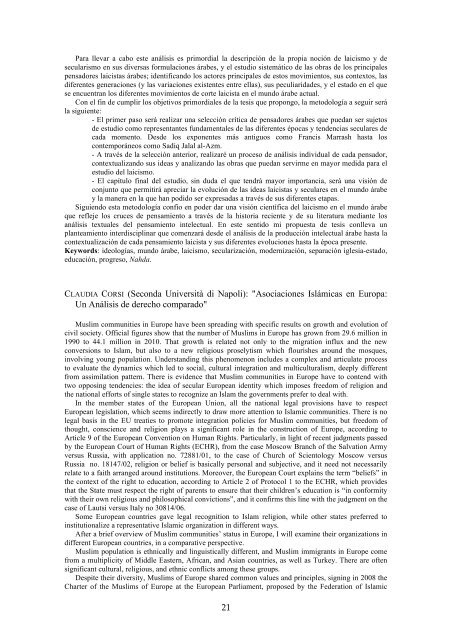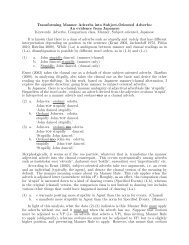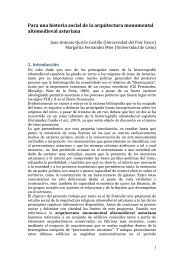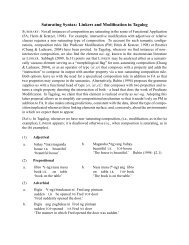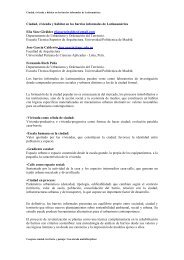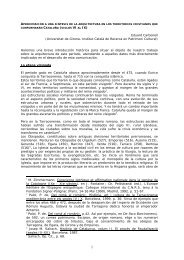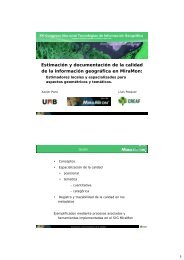Libro de resúmenes / Book of abstracts
Libro de resúmenes / Book of abstracts
Libro de resúmenes / Book of abstracts
Create successful ePaper yourself
Turn your PDF publications into a flip-book with our unique Google optimized e-Paper software.
Para llevar a cabo este análisis es primordial la <strong>de</strong>scripción <strong>de</strong> la propia noción <strong>de</strong> laicismo y <strong>de</strong><br />
secularismo en sus diversas formulaciones árabes, y el estudio sistemático <strong>de</strong> las obras <strong>de</strong> los principales<br />
pensadores laicistas árabes; i<strong>de</strong>ntificando los actores principales <strong>de</strong> estos movimientos, sus contextos, las<br />
diferentes generaciones (y las variaciones existentes entre ellas), sus peculiarida<strong>de</strong>s, y el estado en el que<br />
se encuentran los diferentes movimientos <strong>de</strong> corte laicista en el mundo árabe actual.<br />
Con el fin <strong>de</strong> cumplir los objetivos primordiales <strong>de</strong> la tesis que propongo, la metodología a seguir será<br />
la siguiente:<br />
- El primer paso será realizar una selección crítica <strong>de</strong> pensadores árabes que puedan ser sujetos<br />
<strong>de</strong> estudio como representantes fundamentales <strong>de</strong> las diferentes épocas y ten<strong>de</strong>ncias seculares <strong>de</strong><br />
cada momento. Des<strong>de</strong> los exponentes más antiguos como Francis Marrash hasta los<br />
contemporáneos como Sadiq Jalal al-Azm.<br />
- A través <strong>de</strong> la selección anterior, realizaré un proceso <strong>de</strong> análisis individual <strong>de</strong> cada pensador,<br />
contextualizando sus i<strong>de</strong>as y analizando las obras que puedan servirme en mayor medida para el<br />
estudio <strong>de</strong>l laicismo.<br />
- El capítulo final <strong>de</strong>l estudio, sin duda el que tendrá mayor importancia, será una visión <strong>de</strong><br />
conjunto que permitirá apreciar la evolución <strong>de</strong> las i<strong>de</strong>as laicistas y seculares en el mundo árabe<br />
y la manera en la que han podido ser expresadas a través <strong>de</strong> sus diferentes etapas.<br />
Siguiendo esta metodología confío en po<strong>de</strong>r dar una visión científica <strong>de</strong>l laicismo en el mundo árabe<br />
que refleje los cruces <strong>de</strong> pensamiento a través <strong>de</strong> la historia reciente y <strong>de</strong> su literatura mediante los<br />
análisis textuales <strong>de</strong>l pensamiento intelectual. En este sentido mi propuesta <strong>de</strong> tesis conlleva un<br />
planteamiento interdisciplinar que comenzará <strong>de</strong>s<strong>de</strong> el análisis <strong>de</strong> la producción intelectual árabe hasta la<br />
contextualización <strong>de</strong> cada pensamiento laicista y sus diferentes evoluciones hasta la época presente.<br />
Keywords: i<strong>de</strong>ologías, mundo árabe, laicismo, secularización, mo<strong>de</strong>rnización, separación iglesia-estado,<br />
educación, progreso, Nahda.<br />
CLAUDIA CORSI (Seconda Università di Napoli): "Asociaciones Islámicas en Europa:<br />
Un Análisis <strong>de</strong> <strong>de</strong>recho comparado"<br />
Muslim communities in Europe have been spreading with specific results on growth and evolution <strong>of</strong><br />
civil society. Official figures show that the number <strong>of</strong> Muslims in Europe has grown from 29.6 million in<br />
1990 to 44.1 million in 2010. That growth is related not only to the migration influx and the new<br />
conversions to Islam, but also to a new religious proselytism which flourishes around the mosques,<br />
involving young population. Un<strong>de</strong>rstanding this phenomenon inclu<strong>de</strong>s a complex and articulate process<br />
to evaluate the dynamics which led to social, cultural integration and multiculturalism, <strong>de</strong>eply different<br />
from assimilation pattern. There is evi<strong>de</strong>nce that Muslim communities in Europe have to contend with<br />
two opposing ten<strong>de</strong>ncies: the i<strong>de</strong>a <strong>of</strong> secular European i<strong>de</strong>ntity which imposes freedom <strong>of</strong> religion and<br />
the national efforts <strong>of</strong> single states to recognize an Islam the governments prefer to <strong>de</strong>al with.<br />
In the member states <strong>of</strong> the European Union, all the national legal provisions have to respect<br />
European legislation, which seems indirectly to draw more attention to Islamic communities. There is no<br />
legal basis in the EU treaties to promote integration policies for Muslim communities, but freedom <strong>of</strong><br />
thought, conscience and religion plays a significant role in the construction <strong>of</strong> Europe, according to<br />
Article 9 <strong>of</strong> the European Convention on Human Rights. Particularly, in light <strong>of</strong> recent judgments passed<br />
by the European Court <strong>of</strong> Human Rights (ECHR), from the case Moscow Branch <strong>of</strong> the Salvation Army<br />
versus Russia, with application no. 72881/01, to the case <strong>of</strong> Church <strong>of</strong> Scientology Moscow versus<br />
Russia no. 18147/02, religion or belief is basically personal and subjective, and it need not necessarily<br />
relate to a faith arranged around institutions. Moreover, the European Court explains the term “beliefs” in<br />
the context <strong>of</strong> the right to education, according to Article 2 <strong>of</strong> Protocol 1 to the ECHR, which provi<strong>de</strong>s<br />
that the State must respect the right <strong>of</strong> parents to ensure that their children’s education is “in conformity<br />
with their own religious and philosophical convictions”, and it confirms this line with the judgment on the<br />
case <strong>of</strong> Lautsi versus Italy no 30814/06.<br />
Some European countries gave legal recognition to Islam religion, while other states preferred to<br />
institutionalize a representative Islamic organization in different ways.<br />
After a brief overview <strong>of</strong> Muslim communities’ status in Europe, I will examine their organizations in<br />
different European countries, in a comparative perspective.<br />
Muslim population is ethnically and linguistically different, and Muslim immigrants in Europe come<br />
from a multiplicity <strong>of</strong> Middle Eastern, African, and Asian countries, as well as Turkey. There are <strong>of</strong>ten<br />
significant cultural, religious, and ethnic conflicts among these groups.<br />
Despite their diversity, Muslims <strong>of</strong> Europe shared common values and principles, signing in 2008 the<br />
Charter <strong>of</strong> the Muslims <strong>of</strong> Europe at the European Parliament, proposed by the Fe<strong>de</strong>ration <strong>of</strong> Islamic<br />
21


